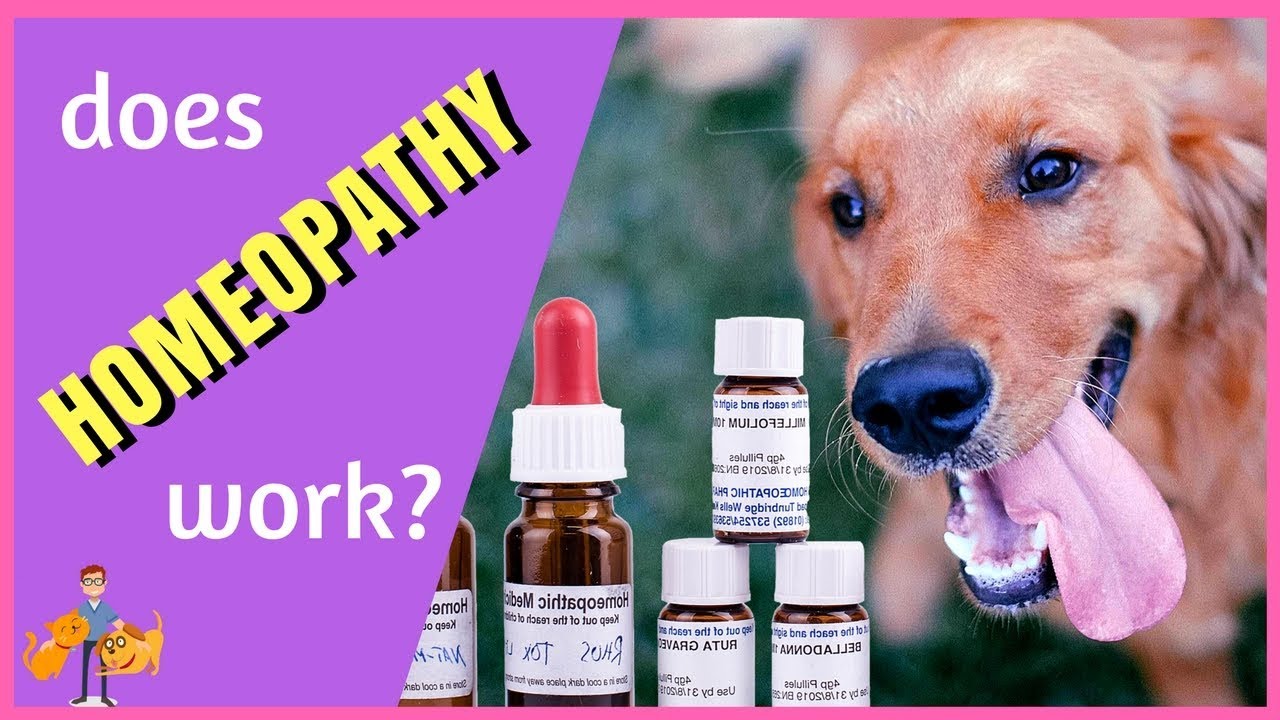Homeopathy For Pets - Exploring Its Benefits And Risks
Homeopathy for pets is a popular alternative medicine practice that involves using natural remedies to treat various health conditions in pets.
Author:James PierceReviewer:Karan EmeryMay 05, 202310 Shares650 Views

Homeopathy for petsis a popular alternative medicine practice that involves using natural remedies to treat various health conditions in pets.
Homeopathic remedies are believed to stimulate the body's natural healing process, promoting overall health and well-being in pets.
As pet owners become more conscious of the side effects of conventional medications, they are turning to homeopathy as a safe and effective treatment option for their furry friends.
In this article, we will explore the benefits of homeopathy for pets, popular remedies used in homeopathy, and tips for using homeopathy to improve your pet's health.
How Homeopathy Works
Homeopathy is a form of alternative medicine that is based on the principle of "like cures like." This means that a substance that causes symptoms in a healthy person can be used to treat similar symptoms in a sick person.
Homeopathy also involves the use of highly diluted substances, often in the form of small sugar pills, which are believed to stimulate the body's natural healing abilities.
According to homeopathy, illness is seen as an imbalance in the body's vital force, or life energy. Homeopathic remedies are designed to stimulate this energy and help the body heal itself.
Homeopathy is believed to work on both physical and emotional levels, and can be used to treat a wide range of health conditions, including allergies, arthritis, digestive disorders, anxiety, and depression.
While there is still some debate about the effectiveness of homeopathy, many people have reported positive results from homeopathic treatments.
It is important to note, however, that homeopathy should not be used as a substitute for conventional medical treatment, especially in cases of serious illness or injury. Always consult with a qualified healthcare professional before starting any new treatment.

Does Homeopathy Work in Pets?
Principles Of Homeopathy
Homeopathy is based on several core principles, including the principle of similars, the law of minimum dose, and the concept of individualization.
The principle of similars states that a substance that can cause certain symptoms in a healthy individual can also be used to treat similar symptoms in a sick individual.
The law of minimum dose states that the smallest dose of a homeopathic remedy that can produce a healing effect should be used.
Finally, the concept of individualization recognizes that each patient is unique and requires a customized treatment plan based on their individual symptoms and needs.
How Homeopathic Remedies Are Made
Homeopathic remedies are highly diluted substances that are made using a special process known as potentization. The original substance is first diluted in water or alcohol and then shaken vigorously, a process known as succussion.
This process is repeated several times, with each dilution and succussion making the remedy more potent. The end result is a highly diluted and potentized remedy that can stimulate the body's natural healing mechanisms.
Dosage And Administration Of Homeopathic Remedies
Homeopathic remedies are available in various forms, including pellets, tablets, liquids, and powders. The dosage and administration of homeopathic remedies will depend on the specific remedy, the severity of the symptoms, and the individual needs of the patient.
Homeopathic remedies are typically administered orally, either directly in the mouth or dissolved in water. The dosage and frequency of the remedy will be determined by a qualified homeopath or veterinary homeopath based on the individual needs of the patient.
It is important to follow the dosage and administration instructions carefully to ensure the best possible results.
Overall, homeopathy can be a safe and effective form of treatment for pets when used under the guidance of a qualified veterinary homeopath.
By addressing the underlying causes of disease and promoting natural healing, homeopathy can help pets achieve optimal health and well-being.
Benefits Of Homeopathy For Pets
Homeopathy is a popular alternative medicine that has gained recognition in recent years for its benefits in treating various health conditions in pets. Some of the benefits of homeopathy for pets include:
Non-Toxic And Safe
Homeopathic remedies are made from natural substances, making them safe and non-toxic for pets. Unlike conventional medications, homeopathic remedies do not produce any adverse side effects, making them a popular choice for pet owners.
Effective
Homeopathic remedies work by stimulating the body's natural healing mechanism, helping to restore balance and improve overall health. Many pet owners have reported positive results with homeopathy, especially in treating chronic conditions.
Customized Treatment
Homeopathy treats each pet as an individual and provides customized treatment based on their unique needs. This approach ensures that the remedy is tailored to the pet's specific symptoms and characteristics, providing effective treatment.
Affordable
Homeopathic remedies are relatively inexpensive compared to conventional medications, making them a cost-effective alternative for pet owners who are looking for natural and safe treatment options.
Improves Overall Health
Homeopathy not only treats the symptoms of the disease but also addresses the root cause of the problem. By improving the pet's overall health, homeopathy can prevent future health problems and ensure a healthier and happier life for pets.
However, it is important to note that homeopathy should not be used as a replacement for traditional veterinary care. It should only be used as a complementary treatment under the guidance of a qualified homeopathic veterinarian.
Risks Of Homeopathy For Pets
Homeopathy is a holistic form of treatment that has been used for centuries to treat a wide range of ailments in humans, and more recently, in pets as well.
While many pet owners and veterinarians swear by the effectiveness of homeopathy for pets, there are also some potential risks and drawbacks to be aware of.
Delayed Treatment
One of the biggest risks of relying solely on homeopathy for pets is the potential for delayed treatment.
In some cases, the symptoms of a serious or life-threatening condition may be masked or alleviated by homeopathic remedies, leading pet owners to delay seeking conventional medical treatment. This can be especially dangerous in cases of acute illness or injury.
Incorrect Diagnosis
Another risk of homeopathy for pets is the potential for an incorrect diagnosis. Homeopathy is based on the principle of treating the whole animal rather than just the symptoms, which can make it difficult to determine the underlying cause of a pet's illness or behavior.
Without an accurate diagnosis, it may be difficult to choose the appropriate homeopathic remedies or to determine if other forms of treatment are needed.
Side Effects
Although homeopathic remedies are generally considered safe for pets, they can still cause side effects in some animals. Common side effects include digestive upset, lethargy, and increased thirst or urination.
In rare cases, more serious side effects can occur, such as allergic reactions or toxic effects from improperly prepared remedies.
Lack Of Regulation
Another potential risk of homeopathy for pets is the lack of regulation in the production and sale of homeopathic remedies.
Unlike conventional drugs, homeopathic remedies are not subject to the same strict standards for quality control, purity, and potency. This can make it difficult to ensure the safety and efficacy of the remedies being used.
Limited Scientific Evidence
While many pet owners and veterinarians believe in the effectiveness of homeopathy for pets, the scientific evidence to support its use is limited.
Most studies on homeopathy are small, and the results are often conflicting or inconclusive. This can make it difficult to determine the true benefits and risks of homeopathy for pets.
It is important for pet owners to weigh the potential risks and benefits of homeopathy for their pets and to work closely with a qualified veterinarian to ensure that their pet's health and wellbeing are being properly addressed.
People Also Ask
Can Homeopathy Be Used For All Types Of Pets?
Yes, homeopathy can be used for all types of pets, including dogs, cats, horses, birds, and even small animals like rabbits and guinea pigs.
Is Homeopathy Safe For Pets?
Yes, homeopathy is considered safe for pets when used properly. It is a gentle and non-invasive form of treatment that does not produce any harmful side effects.
What Kind Of Conditions Can Be Treated With Homeopathy For Pets?
Homeopathy can be used to treat a wide range of conditions in pets, including allergies, arthritis, anxiety, digestive problems, skin conditions, and more.
Final Thoughts
Homeopathy for pets is a growing area of interest for pet owners who prefer a more natural and holistic approach to their pet's health care.
While it is not a replacement for conventional veterinary medicine, homeopathy can be used alongside it to provide additional support and benefits for pets.
By working with a qualified and experienced homeopathic veterinarian, pet owners can explore the potential benefits of homeopathy for their furry friends.
As with any form of treatment, it is important to do thorough research and consult with a professional to ensure the best outcomes for your beloved pets.

James Pierce
Author

Karan Emery
Reviewer
Latest Articles
Popular Articles